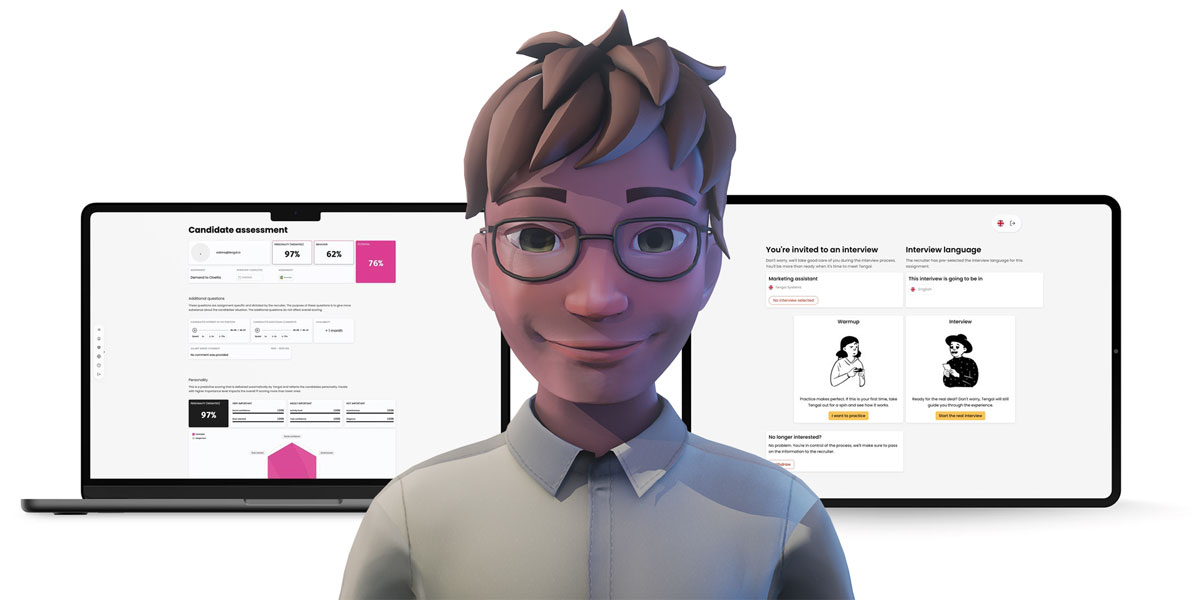Interview screening:
Everything recruiters need to know
In this guide, we’ll look at interview screening, why it’s important for recruiters, and how to save time and money while still finding the best candidates.
Tengai's interview
screening process guides the candidate
Introduction
Interview screening is a critically important part of the hiring process. With a vacancy on the team, employers may face issues behind the scenes that negatively affect morale and productivity. So, when hiring managers are looking to fill the role, there’s more often than not a sense of urgency surrounding the process. With one less team member around, work may pile up and create delays. This is especially true if the open position is specialized. It’s an all-around unpleasant situation. For these reasons, it’s easy to understand why employers may be quick about vetting candidates. No matter how tempting it is to speed through the hiring process, it’s almost never a good idea.
What interview screening is
A screening interview is a brief job interview to determine whether the applicant you’re speaking to is qualified. The interview will determine if they match your job requirements for the position and if their credentials are a fit for the role your company is hiring for.
In most cases, a screening interview includes a brief review of an applicant’s employment and educational background and a few questions. The questions will be about the applicant's qualifications, but as the interviewer, you may also want to know what their salary expectations are and how their availability to work looks. You can conduct a screening interview over the phone, via video chat, or in person. The results of your interview screening process will determine if the candidate moves to the next round of your interview process.
Is screening the same as interviewing?
A screening interview is an event in your hiring process through which you, the recruiter, can gauge how suitable the applicant is for the job you want to hire for and decide whether or not to add their name to a shortlist of potential hires. Typically, this is the first interview a candidate will face when applying for your job.
Why conduct screening interviews?
The hiring process can be time-consuming. If the applicant isn’t the right fit, you don’t want to waste your time or the candidate’s time. Vetting job applicants is an important and understated part of choosing the right candidate. If a company rushes through its screening process — or skips it altogether — the negative consequences could outweigh the benefits. Sure, you might be able to get your new employee trained and working ASAP. That won’t matter, however, if you later discover they lied or omitted important information during the interview.
As highlighted in Glassdoor’s article, “How To Calculate Cost-Per-Hire” companies can spend EUR 3,000 or more to hire a new employee. Now imagine if, because of a lack of proper screening, you repeat that process. The cost will add up, both financially and in terms of time. Even if your team is struggling with an open position, your company should be cautious about bringing new people on board. After all, you’ll be in the same position if either you or the candidate realizes it’s not a good fit later on.
Setting aside the money it will cost to look for a replacement, having a bad hire on your team can also cost you. As frustrated as you may be with having an open position, it will actually be less costly and stressful in the long term if your company vets its candidates thoroughly.

Types of screening interviews
1. Text screening
With just a few clicks, invite hundreds or thousands of candidates to engage in a brief text interview with custom screening questions. The Modern Hire platform also offers an industry-leading text-based assessment that can help predict turnover risk.
2. Phone screening interviews
Phone screening interviews are common when narrowing down a final list of candidates. Preliminary phone interviews are less stressful for candidates and are a convenient way to conduct the interview with no interruptions. One drawback is that since you can’t see the candidate, you aren’t able to observe their body language and gestures throughout the interview. Another drawback of phone screening interviews is that it's very time-consuming for the recruiter.
3. Video screening interviews
- Face-to-face, using a videoconferencing service like Zoom, Skype, or Google Meets
- One-way, pre-recorded responses to prepared questions sent ahead of time to the candidate
Using video, you can observe the candidate’s body language and gestures. This type of screening interview is more in line with the formal interview process.
4. Questionnaire Screening Interview
If you want to narrow down an extensive list of candidates in a timely fashion, consider conducting a questionnaire screening interview. Provide the candidates with specific questions that assess their qualifications for the position and fit with the company. Questionnaires allow you to screen a large pool of candidates without taking time to speak to every person. One drawback to this method is you don’t physically speak to the candidate to get a first impression of their personality.
5. Chatbot screening
Instead of going through piles of resumes every day, interview Chatbots conduct your initial online screening round with your candidates as they apply. These chatbots are designed to answer all of your repetitive and time-consuming questions to figure out whether or not an applicant is qualified for the role.
6. Automated screening
If you’re in recruitment or HR, you’ll likely be familiar with the ongoing shift towards automated resume screening as part of the recruitment process. Automated interviewing screening tools offer scalable candidate engagement. Candidates record their answers to your custom questions when it’s convenient for them. Then automatically advance candidates who meet your qualifications to the next stage. AI-powered resume screening is the tool that gives recruiters their time back. The screening that manually took hours and hours is automated, meaning the person in charge of hiring reduces their time-to-fill, without reducing their quality of hire metric.

Use screening technology to save time
If you have a small hiring staff or work for a large company with many open positions, streamlining your hiring is a top priority. One of the most effective ways to quickly save valuable time is to utilize available technology to make faster hiring decisions. Automating your reference checking process, for example, is one of the easiest and most effective ways to save at least one hour per candidate. Instead of spending hours on the phone chasing down interviews with people listed as references, you can simply email each reference a link to an online survey. Respondents can then provide their honest feedback at their own time and convenience.
Finding highly talented and high-performing people is critical to any company’s success. By speeding up your hiring process, you can ensure that you are getting highly qualified employees and putting them to work as quickly as you can.
Tengai is a recruitment automation software that’s intuitive and transparent, so you can easily tailor and follow your process from beginning to end. With Tengai, you get access to validated candidate recommendations and conversational AI that enhances the candidate experience. The user-friendly interface gives you the option to listen to interview audio before you decide on which candidate to invite for the first interview. Tengai’s natural language processing engine and interview analytics assist you to make better hiring decisions while delivering a more equal and fair candidate experience. More job seekers get a chance and are treated and evaluated the same way.
Tengai’s interview screening process guides the candidate
Imagine a recruiter that treats all candidates the same, always asks the same questions and doesn’t care about appearance, gender or age. Well, you don’t have to imagine because they already exist! Introducing Tengai, the social AI avatar that is programmed to conduct objective screening interviews. Tengai is unique and a very effective recruitment tool because it can establish a “human” connection with candidates during job interviews.
Tengai was developed to streamline the screening phase by guiding candidates through a structured interview and collecting relevant data. With Tengai's structured interview data, you can compare candidates' personality fit and identify the right candidates for face-to-face interviews. At the same time, you are creating a more interactive and fun candidate experience. The Tengai avatar is the interface between our recruitment platform, Tengai Recruiting Hub, and our candidate platform Tengai Talent Hub.

In comparison to a chatbot, Tengai’s social behavior makes behavioral realism possible. This is crucial to enhancing the candidate experience. The immersive experience Tengai creates during an interview is one of the things that makes the interview software unique. Some have questioned if Tengai would be as effective as a chatbot but the fact is, being a conversational AI robot is crucial to the immersive candidate experience.
An interview avatar with a human interface
Tengai creates the feeling of being there with a real person, which is a crucial component of interaction according to Furhat Robotics, who are specialists in social robots. This makes the user “suspend their disbelief” and treat it as reality. A similar argument can be used for robots compared to seeing the same thing on a computer screen, talking to it on the phone, or chatting with it using text.
Behavioral realism
Behavioral realism definition is the complete absence, or presence, of nonverbal behavior. In Tengai’s case, the focus is on how consistent the nonverbal behavior is with actual humans (e.g. eye contact). Studies show that behavioral realism is a powerful predictor of perceived social presence. Tengai’s natural behavior creates a higher level of intimacy and connectedness.
Try a demo of the Tengai interview!
Try a demo interview- Develop hiring criteria that accurately reflect the requirements of the position
- Prepare screening interview questions that assess the hiring criteria
- Re-review resumes for any areas in question or that need clarification
- Contact candidates via email to schedule a time for the interview
- Prep screening Interview questions to ask
Screening interviews are preliminary and should gather basic information about the candidate’s skill set, relevant experience, personality traits, and potential cultural fit. While there are countless options, the following screening interview questions should provide enough insight to determine whether they should proceed through the hiring process.
10 things to ask as a recruiter
1. What is your required salary range?
Before diving into the nitty-gritty, it’s best to address compensation requirements. Candidates may be hesitant to provide this information, but their desired salary is a deciding factor in whether to move forward with the interview process. If they’re looking for EUR 30k and the salary is EUR 10K, negotiation is unlikely, and it makes sense to remove the candidate from consideration.
2. Tell me about yourself
Once you’ve determined that their salary requirements match the position, let the candidate summarize their background. You can gather high-level information about their professional and cultural fit for the position. It can also help them ease into the interview and relieve some of their nerves. (Top tip: Pay attention to their experience and personality traits. They’ll likely cover a majority of the information listed on their resume but may give additional insight into experience or skills that weren’t included.)
3. Why are you looking for a new role?
Whether the candidate has another job or is currently unemployed, their answer will give you a better understanding of their motivation for job searching. They can also explain any gaps in employment or clarify why they’re currently unemployed. An ideal candidate will explain how this role fits into their career progression and what skills or experience they are looking to gain. If they speak negatively about their previous employers, that’s a red flag that they may not be the right cultural fit for the company.
4. How did you learn about this position?
This question simply identifies how the candidate found the position. If they mention any internal employees that recommended them, you can leverage the employee as a reference outside of those provided by the applicant. Their response also gives you feedback about the efficiency of your recruitment methods. If multiple candidates found the job posting at the same source, you can use that as your primary recruiting medium for future roles.
5. What skills from your previous job make you the right fit for this position?
Though the screening interview is preliminary, you want to assess their skill set and abilities. Specific experience from other jobs can help you assess their ability to fulfill the duties of the position they’re interviewing for.
6. What motivates you at work?
Hard skills aside, try to dig into the cultural compatibility of a candidate. Find out what drives the candidate to put forth their best effort. You want to find people who are motivated by the responsibilities and environment that match your organizational culture. Responses that exemplify a drive to produce high-quality work and contribute to the overall success of the company signify a strong candidate.
7. What type of work environment and management style do you prefer?
Building off of their motivation, continue to assess the cultural fit by learning about the candidate’s preferred work environment and management style. You’ll gain valuable information about their personality and ability to work with different types of individuals. Ideally, the candidate’s preferences will align with the organization and the position. If they prefer working independently but the role is heavily team-based, they wouldn’t be the best match.
8. What do you look for in a company’s culture?
You’ve assessed the candidate’s hard skills and personality traits as it relates to the position. Dive deeper into the cultural fit by pinpointing their ideal organizational culture. Look for candidates whose values align with the company, and who are eager to contribute to the existing culture.
9. If hired, when can you start?
This screening question is straightforward: find out when the candidate can begin working should they be selected for the position. If they’re currently employed, look for a start date approximately two weeks after an offer would be extended, unless they need to give their current employer extended notice. If they’re unemployed, they should be ready to start immediately upon receiving an offer.
10. Do you have any questions for us?
Once you’ve asked all of your prepared questions, open the floor to the candidate. Let them ask any questions they may have. This allows applicants to clarify any uncertainties about the position and the company while also gauging their interest in the position. If they don’t come prepared with questions, that can be a red flag indicating they’re applying to jobs in bulk for the sole purpose of getting a job.
"The screening interview should be convenient, rewarding and efficient for candidates."
- Sinisa Strbac, Chief Product Officer at Tengai
What to look for during a screening interview
An effective screening interview is your best insurance against pointless interviews. Without it, you risk wasting the time of senior team members on interviewing applicants who may look good on paper but aren’t right for the job. Interview screening isn’t about deciding who you’re going to hire. Its purpose is to identify those candidates who you are certain won’t make the final cut. It’ll ensure that you’ll only grant a second interview with the best candidates who have a good chance of being hired.
Determine what really matters
If you’re hiring for a position that needs to be filled as soon as possible, you probably won’t pursue a candidate that requires a three-month notice period. Think about your needs. Are you exclusively looking for a full-time, experienced, immediately available business graduate who’s willing to relocate? Or are you ready to be flexible in order to secure a stellar candidate?
Be prepared to discuss
The call isn’t only about candidates answering your phone screening questions. It’s also a great opportunity for you to clarify details about the position and the hiring process. Make sure that, by the end of the call, candidates understand fully what the role is about as well as what the next steps are. If you’re a recruiter, this means you’ll have to spend some time talking to the hiring managers so that you’ll be ready to give a clear explanation of the role.
Read their resume
Candidates can tell if you haven’t read their resumes and they certainly won’t like it. Additionally, knowing the candidate’s background is the only way to verify their information or ask about gaps in their resume.
Clear your mind of bias
The purpose of the phone screen interview is to determine whether a candidate deserves an interview. Bias can diminish its effectiveness. If you were impressed by a candidate’s resume and you’re already determined to bring them in for an interview, the call is obsolete. Conversely, if you don’t like this candidate because of their cover letter or resume, you’re likely to deny them the opportunity anyway. Avoid the risk of making a bad decision by being objective.

After the Screening Interview
Following the screening interview, it’s time to decide which candidates pass through to a second interview. Using any notes you took, select the most qualified candidates that meet the hiring criteria and fit culturally. If there is a separate hiring manager for the position, review notes from the screening interviews with them.
Candidates that meet the requirements for education and experience but displayed red flags should be considered carefully. If they have different preferences in work environment and management style but possess the hard skills required to succeed, you may still consider them for a second interview.
How to save time and money with a better screening process
Vetting job applicants is an important and understated part of choosing the right candidate. If a company rushes through its screening process — or skips it altogether — the negative consequences could outweigh the benefits. Time is money, so anything you can do to speed up this process and save your HR department valuable hours will have major cost-cutting benefits. The following are just a few things you can do to save at least an hour per candidate.
Start with a clear candidate profile
Before you even begin advertising a position and interviewing candidates, it is important to start with a strong competency profile. What skills and abilities should an individual in this position have? Are you looking for a specific educational background, experience, and skill set? In some cases, this might involve interviewing people already in similar positions to determine which elements to focus on in your job search.
As you create a persona describing your ideal job applicant, ask yourself some of the following questions:
- What previous experience should he or she have?
- What kind of education and training should this person possess?
- What are his or her goals?
- What are this person’s strongest skills?
- What is this individual’s attitude?
- Who would not be a good fit for the role?
- How will this person fit in with the company culture?
Pre-screen your candidates
Once you start receiving applications, now is the time to begin pre-screening candidates. You don’t want to waste hours interviewing 15 applicants when only five of them are qualified for your job. Use a rigorous screening process to sift through candidates who don’t meet the requirements, who don’t have the necessary experience, or who don’t seem like they would be a good culture fit.
You might want to use a variety of pre-screening strategies such as application reviews, phone screenings and automated CV checks. Automating this process allows hiring managers to quickly collect a lot of information on job applicants early in the hiring process. This can make it easier to narrow your pool of candidates down to a select few who are the most qualified for the job.
Conclusion: Experience better candidate screening with Tengai
Tengai can help you provide exceptional conversational-AI-centric service to your customers. Our two-way interactive dialogue is designed to be both fair and exciting to ensure every applicant has a better candidate experience. Being interviewed by Tengai is also an opportunity for candidates to add information to their application and show more of their personality. As a result, job-seekers who have talked to Tengai state that it made them engage both emotionally and socially.
Check out other resource pages
Robot interviews
Learn more about the development of human-like robots.
Unbiased recruitment
A free guide for anyone who is interested in competency-based recruitment.
Candidate UX report
What do candidates really think about having an interview with Tengai.


.jpg)

